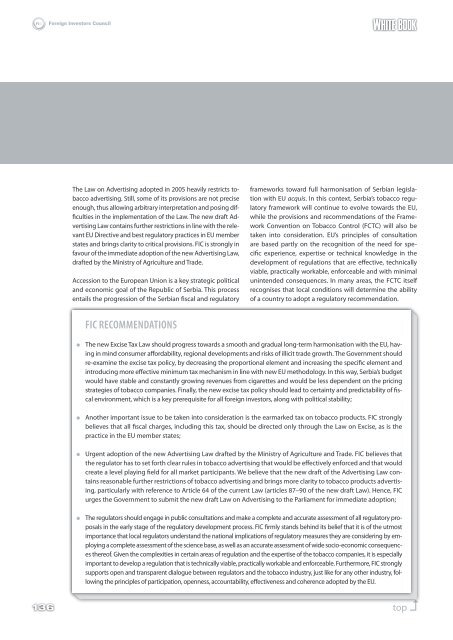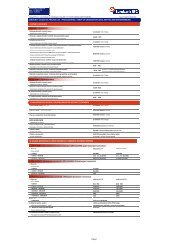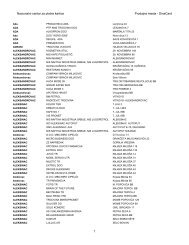Fic rEcommEndationS - Eurobank EFG
Fic rEcommEndationS - Eurobank EFG
Fic rEcommEndationS - Eurobank EFG
You also want an ePaper? Increase the reach of your titles
YUMPU automatically turns print PDFs into web optimized ePapers that Google loves.
The Law on Advertising adopted in 2005 heavily restricts tobacco<br />
advertising. Still, some of its provisions are not precise<br />
enough, thus allowing arbitrary interpretation and posing difficulties<br />
in the implementation of the Law. The new draft Advertising<br />
Law contains further restrictions in line with the relevant<br />
EU Directive and best regulatory practices in EU member<br />
states and brings clarity to critical provisions. FIC is strongly in<br />
favour of the immediate adoption of the new Advertising Law,<br />
drafted by the Ministry of Agriculture and Trade.<br />
Accession to the European Union is a key strategic political<br />
and economic goal of the Republic of Serbia. This process<br />
entails the progression of the Serbian fiscal and regulatory<br />
<strong>Fic</strong> <strong>rEcommEndationS</strong><br />
frameworks toward full harmonisation of Serbian legislation<br />
with EU acquis. In this context, Serbia’s tobacco regulatory<br />
framework will continue to evolve towards the EU,<br />
while the provisions and recommendations of the Framework<br />
Convention on Tobacco Control (FCTC) will also be<br />
taken into consideration. EU’s principles of consultation<br />
are based partly on the recognition of the need for specific<br />
experience, expertise or technical knowledge in the<br />
development of regulations that are effective, technically<br />
viable, practically workable, enforceable and with minimal<br />
unintended consequences. In many areas, the FCTC itself<br />
recognises that local conditions will determine the ability<br />
of a country to adopt a regulatory recommendation.<br />
The new Excise Tax Law should progress towards a smooth and gradual long-term harmonisation with the EU, having<br />
in mind consumer affordability, regional developments and risks of illicit trade growth. The Government should<br />
re-examine the excise tax policy, by decreasing the proportional element and increasing the specific element and<br />
introducing more effective minimum tax mechanism in line with new EU methodology. In this way, Serbia’s budget<br />
would have stable and constantly growing revenues from cigarettes and would be less dependent on the pricing<br />
strategies of tobacco companies. Finally, the new excise tax policy should lead to certainty and predictability of fiscal<br />
environment, which is a key prerequisite for all foreign investors, along with political stability;<br />
Another important issue to be taken into consideration is the earmarked tax on tobacco products. FIC strongly<br />
believes that all fiscal charges, including this tax, should be directed only through the Law on Excise, as is the<br />
practice in the EU member states;<br />
Urgent adoption of the new Advertising Law drafted by the Ministry of Agriculture and Trade. FIC believes that<br />
the regulator has to set forth clear rules in tobacco advertising that would be effectively enforced and that would<br />
create a level playing field for all market participants. We believe that the new draft of the Advertising Law contains<br />
reasonable further restrictions of tobacco advertising and brings more clarity to tobacco products advertising,<br />
particularly with reference to Article 64 of the current Law (articles 87–90 of the new draft Law). Hence, FIC<br />
urges the Government to submit the new draft Law on Advertising to the Parliament for immediate adoption;<br />
The regulators should engage in public consultations and make a complete and accurate assessment of all regulatory proposals<br />
in the early stage of the regulatory development process. FIC firmly stands behind its belief that it is of the utmost<br />
importance that local regulators understand the national implications of regulatory measures they are considering by employing<br />
a complete assessment of the science base, as well as an accurate assessment of wide socio-economic consequences<br />
thereof. Given the complexities in certain areas of regulation and the expertise of the tobacco companies, it is especially<br />
important to develop a regulation that is technically viable, practically workable and enforceable. Furthermore, FIC strongly<br />
supports open and transparent dialogue between regulators and the tobacco industry, just like for any other industry, following<br />
the principles of participation, openness, accountability, effectiveness and coherence adopted by the EU.<br />
136 top �




